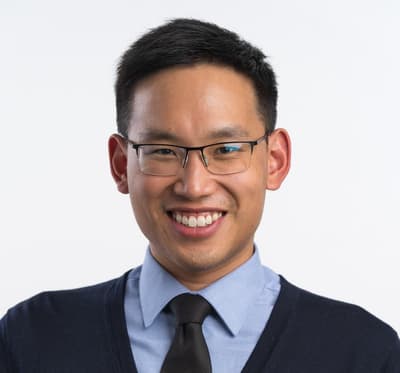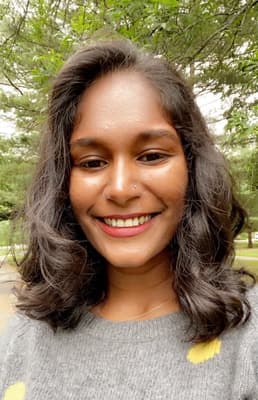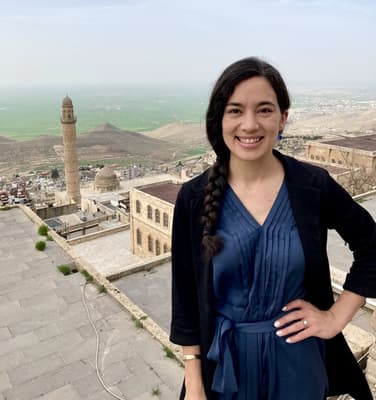In celebration of Asian American and Pacific Islander Heritage Month, the CLS Program is shining a spotlight on three alumni - Jason Chen, Gemma Kelton, and Keely Bakken. They reflect on their Asian American backgrounds and how their identities have influenced their language learning and career paths.
For the last five years, Jason Chen (Chinese 2018) has trained to be a family physician, and he will graduate from his residency as a full-fledged doctor next month. Jason shares how his knowledge of Spanish and Chinese, coupled with his background as the child of Taiwanese immigrants, has allowed him to establish trust with his patients, many of whom are immigrants themselves.
After CLS and graduating from the Asian Studies Program at Bowdoin, Gemma Kelton (Chinese 2021) is working in post-production at Lone Wolf Media, where her interests in film coincide with sharing the stories and experiences of different populations. Gemma shares how growing up in an orphanage and being surrounded by children speaking a myriad of languages established at an early age a desire to be multilingual and better understand the world through language.
Keely Bakken (Turkish 2011, 2012; Russian 2015) serves as a Foreign Affairs Officer at the U.S. Department of State, where she promotes human rights as an essential element of U.S. Foreign Policy, putting her cultural and language understanding of Turkey and Russia into practice.
A thread connecting each of their stories is a deep motivation to better understand their heritage and the identities of others through language and cultural learning. While their career fields are distinct - doctor, film editor, and foreign affairs professional - in each case, their CLS language has been instrumental.
Please note that each interview has been edited for length and clarity.
Jason Chen

CLS Chinese 2018
Rori DiFiore: Could you tell me a little about your background and how it inspired your interest in learning other languages and cultures?
Jason Chen: My parents are from Taiwan and moved to the U.S. for educational opportunities. The immigrant mentality of seeking better opportunities led to us moving frequently when I was young. I felt like an outsider for much of my adolescence and young adulthood. Studying Spanish and spending time abroad in Mexico and Spain was a coping mechanism to finding my own identity as opposed to having it prescribed by others.
In many parts of the country, Asian Americans are seen as perpetual outsiders not belonging to society. Utah, where I grew up, was one of those places. Now living in California, where there are generations of Asian Americans, it has been a healing experience. Seeing how integrated the Asian American community is in places like San Jose has been really interesting. My interest in studying Chinese stemmed from people's curiosity about my background after living in Spanish-speaking countries. It was a way to explore my identity. During my CLS Program, I picked up medical Chinese textbooks which I now reference when interacting with Chinese-speaking patients as a doctor.
RD: Can you tell us more about how you’ve applied Chinese medically and share any stories you have from using it with patients so far in your professional journey?
JC: I'm training to be a family physician, which I wanted to do because feeling like an outsider growing up, I had found my community serving immigrant populations. 70-80% of my patient encounters are in Spanish with migrant farmworkers mainly from Mexico. However, I also have elderly Chinese patients, some undocumented, who have opened up to me because we share a cultural affinity.
I remember having a patient who had been in our clinic system for 5-10 years. She tells me she has never had a pap smear or mammogram. I asked her why and she explained that because she’s undocumented she didn’t feel like she could talk with anyone about this. I felt in a privileged place to be able to help this person.
Another application of my language skills is in assessing the cognitive abilities of elderly immigrants since many do not speak English. For example, I’ve been able to administer the Montreal Cognitive Assessment (MOCA) to screen for dementia during home visits, nursing home rounds, and in the hospital. Helping families assess their loved ones’ cognition and then provide advice on how to maximize their quality of life has been a really meaningful integration of my language skills and clinical training.
RD: It seems speaking patients' languages allows you to access that trusted physician-patient relationship. Were there others in your training with multilingual/multicultural backgrounds?
JC: There’s definitely a need for more medical professionals from different backgrounds who see patients as whole individuals, not just organ systems. My residency recruits many residents who are immigrants or children of immigrants and speak multiple languages. It's grounding to be around those with different socioeconomic backgrounds and stepping into patients' shoes has been incredibly enriching.
RD: With you becoming an official doctor soon, what are your plans? Will you stay at the hospital you're at?
JC: My long-term goal is to work for the State Department as a Regional Medical Officer serving embassies abroad, for which garnering varied cultural experience is important. However, they require 5-10 years of domestic experience first, so in the short-term I want more experience contributing to the Asian American community in the Bay Area. I've been accepted the Contra Costa/UCSF Global Health Fellowship in Malawi next summer. I'm also hoping to spend time in Taiwan to truly understand the immigrant experience my parents had.
Investing in language and cultural skills to work with immigrant populations has been the common thread throughout my 20s. CLS was a great opportunity to take tangible action on those goals in a way that stands out professionally.
RD: It's valuable to celebrate AAPI month by being open to learning about your identity after assimilation erases it for many 2nd generation Americans. Does anything specific resonate for you during this month?
JC: It's been liberating to voice pride in my background and invest effort into learning more about it. I encourage prospective CLS applicants to develop that "identity capital" - the skills that will help you become who you want to be. CLS provides a great avenue for taking action on those objectives in a way that pays dividends professionally.
Gemma Kelton

Chinese 2021
Rori DiFiore: Can you tell me about what you're currently up to after completing CLS and graduating?
Gemma: I graduated about two years ago, and this is my first job - working in post-production as an editor's liaison. It was scary transitioning from just school responsibilities to “adulting”, but I fell back on my love for languages and curiosity about how people interact across translations.
I was drawn to film/TV as I love watching shows and movies and thought using Mandarin in that field would be cool. My interest in languages stemmed from growing up in an Indian orphanage surrounded by a "masala" of tongues like Tamil (my mother tongue), Hindi, Telugu, and others. The only way to communicate was picking up bits of each other's languages.
Rori: How did you become interested in Chinese specifically?
Gemma: In 7th grade, I fell in love with how different Mandarin was from the other languages I knew. The characters, calligraphy seemed beautiful. I thought, "Who would expect an Indian girl to be fluent in Mandarin?" That’s just something that blows people’s minds. And I thought, “You know what, that’s what I’m going to do.”
Rori: For CLS students just starting critical languages, do you have any advice from your own experiences of learning languages from that place of being a beginner?
Gemma: I think I am obsessed with starting over again. The discomfort forces you to lean in and gain confidence. This concept of learning and being different was not foreign to me. When I came to America, I just wanted to be as American as possible, whatever that meant, and to fit in with everybody else. Forget everything that I knew. And that obviously failed.
I learned very hard lessons when I came to the U.S. I eventually decided that if I am going to be different, I might as well lean into it. And that's what Mandarin enabled me to do, to lean into that discomfort. It made me more confident, not only in my language abilities, but my own knowledge and having lived in China for several years, it's given me a well-rounded understanding of the world. It helped me to develop a cultural and linguistic understanding between not only English and Mandarin, but between English, Tamil, Hindi, Mandarin, how all those languages work together. It's just fascinating.
It gives cultural and linguistic insights into how languages interact that you miss with just word-for-word translations. Also, the CLS language pledge really improves abilities.
Rori: Can you share any memories of the CLS cultural components since you did the virtual program?
Gemma: Staff from my CLS institute in Taiwan would go to markets and other locations with a Zoom camera so we could virtually experience it. It felt like we were really there. But if I’d choose a favorite part, I’d have to say my twice-weekly meetings with my partner. We’ve become close friends and I still talk to her two to three times a week. She'll FaceTime me from different places in Taiwan.
Rori: How have you applied your language skills academically or professionally?
Gemma: By learning languages, specifically Arabic and Mandarin, it's given me a broadened perspective. It's opened my horizons and broadened not only my political understanding of our world but also got me more interested in cultural diplomacy and how not just politics of countries can interact with each other to build trust, but how languages and cultures can be brought from one place to another, and whether that can be intermixed.
I've thought about doing ethnographies on the idea of how language is not only a direct word-to-word, A-to-B translation, but what I'm more interested in is what is lost in that translation. There is no direct one-to-one translation; there's always something lost, especially in Mandarin. You see this a lot; characters, tones matter. For my senior thesis on transracial/transnational adoption as an adoptee, reading Asian American women writers enabled me to write my own story comfortably. You've probably heard of them like Crying in H Mart by Michelle Zauner or R.F. Kuang, she's 25 years old and has written dozens of novels. By giving credibility to their voices, I was able to write my own story.
Rori: What does AAPI Heritage Month mean to you?
Gemma: It's when I feel most seen and can claim being Asian American with pride. My social media gets filled with Asian American content. I rely on it to explore new writers, podcasts, etc. and validate their voices, not just as an Asian but as an adoptee too.
Keely Bakkan

Turkish 2011, 2012; Russian 2015
Rori DiFiore: Could you tell us a little more about your Asian American/Pacific Islander background and how that may have factored into your interest in different cultures and language learning?
Keely Bakkan: My family on my mom’s side is Chinese and Portuguese—not an uncommon heritage in Hawai’i, where my mom is from! We grew up listening to Hawaiian stories and hearing Hawaiian pidgin, a creole I’ve come to appreciate more as an adult and especially after studying other languages. I think my curiosity for exploring my own heritage and background contributed to my interest in learning more about and understanding others.
RD: How has the Turkish or Russian language been instrumental to your career in government service?
KB: My knowledge of Turkish and Russian has been key to getting my foot in the door in a government career, and has been extremely helpful whenever I’ve traveled for work to places like Turkey, Azerbaijan, Uzbekistan, and Kazakhstan. It helps me connect with people, ranging from government officials to members of civil society, and informs my work.
RD: Could you tell us a little bit more about the work you are doing at the Bureau of Democracy, Human Rights, and Labor at State?
Keely: I work in the Office of European and Eurasian Affairs in the State Department’s Bureau of Democracy, Human Rights, and Labor, where I focus primarily on Turkey, other countries in Southeastern Europe, and Western Europe. My office makes sure that we continue to prioritize the protection and promotion of human rights as a key element of U.S. foreign policy. As part of that effort, we produce an annual Human Rights Report that documents the state of human rights around the world.
RD: What does celebrating AAPI month mean to you?
KB: I think it’s important to remember and celebrate the accomplishments and contributions of everyone, including Asian Americans and Pacific Islanders, both during this month and year-round.


